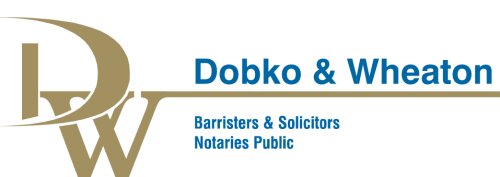Best Tax Increment Financing Lawyers in Grande Prairie
Share your needs with us, get contacted by law firms.
Free. Takes 2 min.
List of the best lawyers in Grande Prairie, Canada
About Tax Increment Financing Law in Grande Prairie, Canada
Tax Increment Financing (TIF) is a public financing method used to subsidize community-improvement projects in Grande Prairie, Canada. By capturing the future tax revenues caused by an increase in property value due to development, this mechanism funds current improvements. TIF is particularly useful in revitalizing underdeveloped or distressed areas, facilitating urban development, and encouraging investments.
Why You May Need a Lawyer
Understanding the complexities of Tax Increment Financing can be challenging, and there are several scenarios where legal advice is beneficial:
- Negotiating terms of the TIF agreement with government authorities.
- Ensuring compliance with local regulations when planning a development project.
- Navigating disputes or clarifications regarding property assessments and tax increment calculations.
- Understanding the implications of TIF for investment or revenue forecasts.
- Drafting or reviewing contracts and legal documents related to TIF projects.
Local Laws Overview
In Grande Prairie, Tax Increment Financing is governed by provincial legislation and municipal by-laws. Key aspects of local TIF laws include:
- Eligibility criteria for properties and areas designated for TIF projects.
- The process of establishing TIF districts and timelines for development projects.
- Allocation and use of funds generated from tax increments.
- Reporting and accountability requirements for developers and municipalities.
- Regulations ensuring public participation and transparency in TIF projects.
Frequently Asked Questions
What exactly is Tax Increment Financing?
Tax Increment Financing is a method where future gains in taxes are used to finance current improvements, which are expected to create those gains.
How does a TIF district work in Grande Prairie?
A TIF district is an area designated by the municipality for redevelopment or improvement, where increased property tax revenues are reinvested in the district.
Who can initiate a TIF project?
TIF projects can be initiated by local government agencies, developers, or community groups seeking infrastructure improvements and economic development.
What types of projects can be funded through TIF?
Typical projects include infrastructure improvements, development of commercial and residential properties, and brownfield rehabilitation.
How are TIF funds generated?
TIF funds are generated by the increased property tax revenue that results from rises in property values within the TIF district after improvements are made.
Is public input required in the TIF process?
Yes, public hearings and consultations are often part of the process to ensure community support and transparency.
Can property owners opt out of a TIF district?
No, once a TIF district is established, all properties within its bounds are included in the financing plans and tax increment calculations.
What are the risks associated with TIF?
Risks include potential disputes over tax assessments, delayed developments, and financial impact if projected tax increments do not materialize.
How long does a TIF district last?
Typically, the lifespan of a TIF district ranges from 15 to 30 years, during which time the tax increments are used to fund the improvements.
Can tax increments be used for any type of expense?
No, tax increments are generally restricted to covering the costs of improvements and public works that benefit the TIF district.
Additional Resources
The following resources can provide more information and assistance on Tax Increment Financing in Grande Prairie:
- City of Grande Prairie - Economic Development Department
- Alberta Urban Municipalities Association
- Alberta's Ministry of Economic Development, Trade and Tourism
- Local chambers of commerce for networking and support
- Municipal finance and planning departments
Next Steps
If you are seeking legal assistance in Tax Increment Financing in Grande Prairie, consider taking these steps:
- Schedule a consultation with a lawyer specializing in municipal or real estate law.
- Gather all relevant documents related to your property or project proposal.
- Prepare a list of questions and objectives for your legal consultation.
- Engage with local government officials to understand specific TIF opportunities and obligations.
- Attend local workshops or seminars on TIF for further knowledge and networking.
Lawzana helps you find the best lawyers and law firms in Grande Prairie through a curated and pre-screened list of qualified legal professionals. Our platform offers rankings and detailed profiles of attorneys and law firms, allowing you to compare based on practice areas, including Tax Increment Financing, experience, and client feedback.
Each profile includes a description of the firm's areas of practice, client reviews, team members and partners, year of establishment, spoken languages, office locations, contact information, social media presence, and any published articles or resources. Most firms on our platform speak English and are experienced in both local and international legal matters.
Get a quote from top-rated law firms in Grande Prairie, Canada — quickly, securely, and without unnecessary hassle.
Disclaimer:
The information provided on this page is for general informational purposes only and does not constitute legal advice. While we strive to ensure the accuracy and relevance of the content, legal information may change over time, and interpretations of the law can vary. You should always consult with a qualified legal professional for advice specific to your situation.
We disclaim all liability for actions taken or not taken based on the content of this page. If you believe any information is incorrect or outdated, please contact us, and we will review and update it where appropriate.









